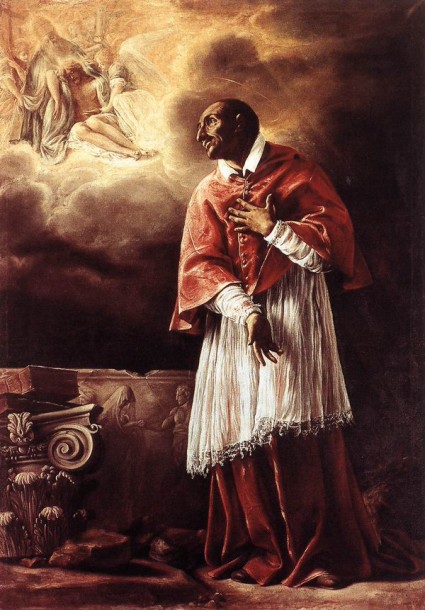 St. Charles Borromeo (1538-1584)
St. Charles Borromeo (1538-1584)
Image Courtesy: Laurent Benoit-Marie
(Franciscan Media) Born in Italy Novara to a wealthy family, Charles was the third of six children according to SQPN his father was Giberto II Borromeo, his mother Margherita de Medici and his uncle Pope Pius IV (1559-1565)
Even though Charles belonged to the Milanese (Milan) nobility and his mother and uncle were ascendants of the powerful ‘Medici’ family, Charles desired to devote himself to the Church. — When his uncle Cardinal Giovanni Angelo Medici, was elected Pope, he made Charles Cardinal-Deacon and Administrator of the Archdiocese of Milan, even though he was yet a laymen — because of his intellectual qualities, Charles was entrusted with several important office connected with the Vatican, he would later be appointed Secy of State with the responsibility of the Papal states.
With the untimely death of Charles’ elder brother brought Charles to the definite decision to be Ordained a Priest, despite his relatives persuasion that he instead be married. Soon after he was Ordained a Priest at the age of 25, Fr. Charles was consecrated Bishop of Milan.
Due to Bishop Charles Borromeo work at the Council of Trent he was not permitted to take up residence in Milan until the ‘Council’ was over. Bishop Borromeo encouraged the Pope to renew in 1562 after it had been suspended for 10 years all the while working behind the scenes. — Bishop Borromeo deserves the credit for keeping the ‘Council’ in session when at several points it was on the verge of breaking up, Bishop Borromeo, took it upon himself, the arduous task of the entire correspondence during the final phase.
Eventually Bishop Borromeo was allowed to devote his time to the Archdiocese of Milan, where the religious and moral picture was far from positive. The reform needed in every phase of Catholic life among both the Clergy and Laity was initiated at a Provincial Council of all the Bishop’s under him. — Specific regulations were drawn up for the Bishop’s and other Clergy. If the people were to be converted to a better life, Bishop Borromeo had to be the first to give a good example and renew their apostolic spirit.
Bishop Borromeo took that initiative of providing a good example and would allot most of his income to charity, he would forbid himself of all luxury and would impose strict penances upon himself. — Bishop Borromeo would sacrifice wealth, high honors, esteem and influence to become poor.
During the plague and famine of 1576, Bishop Borromeo attempted to feed between 60,000 to 70,000 people daily. To accomplish this mission, he borrowed large sums of money that took years to repay. — Where the civil authorities fled at the height of the plague and famine, Bishop Borromeo stayed in the city, where he would minister and provide counsel to the sick and dying, always helping anyone in need.
Bishop Borromeo’s work and heavy burdens took their toll on him and began affecting his health and at just 46 yrs of age he died in November 1584 — Bishop Borromeo was Beatified in 1602 by Pope Clement VIII and Canonized just 8 yrs later in 1610 by Pope Paul V
Related: For Today’s Holy Scripture Readings on the Memorial of St. Charles Borromeo, Visit: -USCCB